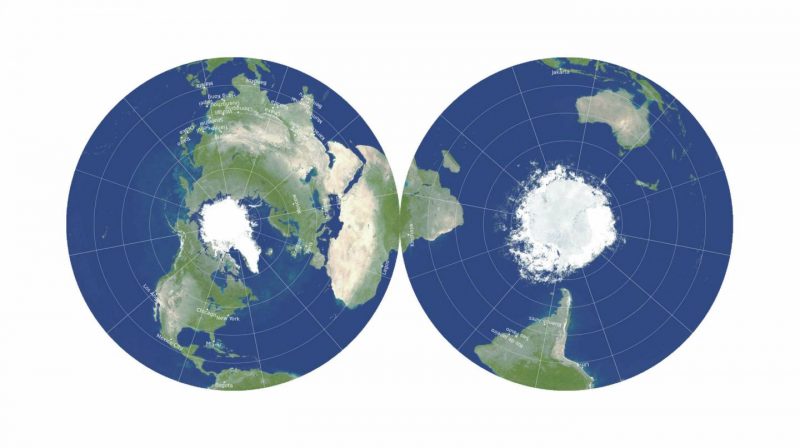-
c_prompt permalink
Pretty interesting new method to accurately display our round planet on anything other than a globe: Astrophysicists design ‘radically different’ world map.
You know the old problem of how to portray the round globe of Earth on a flat map? Now a trio of map experts has worked together to solve this problem. Their new map is 2-sided and round.

-
c_prompt permalink
Thanks for sending support a picture of the error. That helped troubleshooting. It appears the error might be caused by an open issue on Version 0.63.9 Chromium: 73.0.3683.75 (Official Build) dev (64-bit) (see also here). Until the bug is fixed, anyone having an issue can try the following workaround:
For now, Brave users should be able to disable the WebTorrent extension as a workaround, and PeerTube should work as normal. Go to brave://settings, search for WebTorrent, and disable it. This is a problem with Brave's WebTorrent extension.
-
c_prompt permalink
You're welcome. Please don't forget that valME works based on upvotes :)
Both links work for me using different browsers and IP addresses. Also, I'm not seeing any problems in the logs regarding server issues. Is it possible that some people might be clicking on an improperly formed link (such as missing one or more characters at the end)? You might want to verify that the link they are clicking on is the proper link.
-
c_prompt permalink
In the opinion of Martin Armstrong:
There is absolutely no hope whatsoever of fixing this problem of a pension crisis in Illinois and every solution, like the current one from the Chicago Federal Reserve and its proposed 1% on property annually for the next 30 years, will fail in the end...
Any reader in that state or who has family in that state had better put your property up for sale NOW and get out of town while you still can. Hopefully, a fool has just entered the housing market and its time to get out if you can get a bid.
-
c_prompt permalink
It wasn't my intent to be insensitive but I do believe people should be cautious about accepting the conclusions of these kinds of studies based on the premises. Although I'm not a doctor, I'm a bit skeptical of premises that lead to the conclusion "“This is actually just a drug run” and “I need you to fill my prescription." The links provided include some of the reasons that support my opinion.
in [deleted]
-
c_prompt permalink
First, from Got Your ACE Score? What’s Your ACE Score? (and, at the end, What’s Your Resilience Score?):
There are 10 types of childhood trauma measured in the ACE Study. Five are personal — physical abuse, verbal abuse, sexual abuse, physical neglect, and emotional neglect. Five are related to other family members: a parent who’s an alcoholic, a mother who’s a victim of domestic violence, a family member in jail, a family member diagnosed with a mental illness, and the disappearance of a parent through divorce, death or abandonment. Each type of trauma counts as one. So a person who’s been physically abused, with one alcoholic parent, and a mother who was beaten up has an ACE score of three.
There are, of course, many other types of childhood trauma — watching a sibling being abused, losing a caregiver (grandmother, mother, grandfather, etc.), homelessness, surviving and recovering from a severe accident, witnessing a father being abused by a mother, witnessing a grandmother abusing a father, etc. The ACE Study included only those 10 childhood traumas because those were mentioned as most common by a group of about 300 Kaiser members; those traumas were also well studied individually in the research literature.
The most important thing to remember is that the ACE score is meant as a guideline: If you experienced other types of toxic stress over months or years, then those would likely increase your risk of health consequences.
...
The CDC’s Adverse Childhood Experiences Study (ACE Study) uncovered a stunning link between childhood trauma and the chronic diseases people develop as adults, as well as social and emotional problems. This includes heart disease, lung cancer, diabetes and many autoimmune diseases, as well as depression, violence, being a victim of violence, and suicide.
Now, back to Christine Cissy White's article that you posted:
I HAPPY CRIED when I saw that others my age, with my ACE score, had been prescribed anti-depressants or anti-anxiety medication.
For the first time, I understood it’s not just a personal problem; it’s a social issue. It’s a cause-and-effect thing.
Mood problems are symptoms. ACEs are the problem. I’m not the problem.
I stopped looking at myself to try to figure out what’s wrong IN me and with me. I saw that thousands of other people with ACE scores suffered the same way. I saw that thousands of other people with lower ACEs scores suffered less and led healthier lives.
This changed everything.
...
She then asked again about my childhood.
“It’s in the file,” I said. “Ifyou want to read it, you can; but knowing my ACE score is enough. Over 90% of people in my age group with my history struggle with anxiety and depression. I’m just here to manage my PTSD.”
I was polite and calm and clear that I didn’t want or need to detail my entire life story. I didn’t want to go into daddy issues or feel shame about abuse or talk about the worst things ever done to me. I’m close to 50.
“This is actually just a drug run,” I said. “I need you to fill my prescription. My PTSD is well-managed. I’m not looking to discuss or process or get feedback. I just need that prescription.”
...
I think the ACE questionnaire and study shifts the “what’s wrong with me question?” and changes it to “what happened to me”, as well as:
- What do I not have that I need more of?
- What skills and resources and support did others get, that I can try to give myself now as an adult?
- What do I need to learn so I can teach it to my kid?
- How can I be a parent with high ACEs who has a child with lower ACEs?
- How can I make sure my kid gets all that I lacked?
Here's what I get from reading these articles:
- There is often a scientifically provable direct correlation ("cause-and-effect thing") between your body's physical health and mental health. That's common sense.
- Putting aside the limited scope of the ACE study, physical or emotional trauma (from childhood or otherwise) stresses one's mental health, and the more you've had of either, the more stressed you'll feel. That's also common sense.
- Recognizing you weren't the cause of some traumatic events requires discussions to reason through but the acknowledgment isn't enough to dramatically improve your state of being. You have to take purposeful action beyond that recognition. This scene in Good Will Hunting is a brilliant artistic depiction of "it's not my fault" acknowledgment, but it's Will's difficult choice and purposeful action to do what he really wants (i.e., blowing off a good job, leaving his friends in Boston to move to California, pursuing a relationship with Skylar while she attends Stanford) that is the path to real mental health improvement.
- After labeling it a "disorder," the mainstream view of dealing with mental illness (if there even is such a disease) primarily focuses on ineffective discussions and "drug runs" to induce chemical changes in the body.
One of the ways I look at life is as a trade of costs for values. I accept the cost of a stressful life because I know the immense wonders, beauty, and inspiration living provides. Cissy's action-oriented bullets at the end, to me, seem a much more positive approach than antidepressants (which highly likely aren't even as effective as supplements and might actually make depression and anxiety worse). Rationally accepting that we "experience a wide range of moral, interpersonal, social and political "problems in living" demands we take personal responsibility for our choices to improve our problem-solving and coping skills as we seek and pursue what makes life worthwhile. In other words, we have limited control over the traumas others inflict but we have a great deal of control over our own choices to deal with them and move forward.
As you continue to work on healing, you may want to check out A Woman's Self-Esteem: Struggles and Triumphs in the Search for Identity by psychotherapist Nathaniel Branden. It's based on what he calls The Six Pillars of Self Esteem (the practices of living consciously, self-acceptance, self-responsibility, self-assertiveness, purposeful living, and personal integrity). There are sentence-completion exercises at the end of each chapter you might find useful for self-improvement. Although I'm glad Cissy seems to be in a much better place, to stop looking within herself to figure out her own shortcomings seems not only limiting but also would appear to leave her more susceptible to regression. I don't believe there's a silver bullet for getting out of depression but I do believe that focusing solely upon the pain others inflicted while ignoring our own irrational, bad choices as key, contributing factors is not the appropriate path to a healthy physical and mental state.
in [deleted]
-
c_prompt permalink
My take FWIW: crying is one of the body's ways of reminding us that we're uncomfortable with a certain situation that requires positive action to change. Your title and words reminded me that "[g]eology is the study of pressure and time. That's all it takes really... pressure... and time." Perhaps it's time to find "a big God-damn poster" and start chiseling at that wall.
in [deleted]
-
c_prompt permalink
From the chart, it looks like Germany's in 19th place - not 16th.
-
c_prompt permalink
Thanks for finding an actual scientific study (although this one is far more recent than the one referred to in the OP). Granted, 127 samples over 30 locations isn't a large sample size but you don't need a PhD or a large study to validate common sense.
-
c_prompt permalink
We describe the lightning network in non-technical terms.
Putting on my non-technical user hat, the mention of these might make eyes get glossy:
- "broadcast this transaction to the blockchain"
- "Why a shared address is needed"
- "a 2-of-2 multi-signature address in Bitcoin speak"
:)
-
c_prompt permalink
I've sometimes been called a conspiracy theorist. It's intended as an insult. I wear it as a badge of honor - it means I pay attention.
As with most scare propaganda, the mainstream media was "reporting" all sorts of connections between Zika and microcephaly early in the game. However, even the scare mongers at the New York Times admit that, of the 2,200+ reported microcephaly cases, only 404 infants have been confirmed as having microcephaly, and only 17 tested positive for Zika:
But how many of the babies actually have microcephaly — and whether the condition was caused by the Zika virus — is still far from clear.
Of the cases examined so far, 404 have been confirmed as having microcephaly.
Only 17 of them tested positive for the Zika virus. But the government and many researchers say that number may be largely irrelevant, because their tests would find the presence of the virus in only a tiny percentage of cases.
An additional 709 babies have been ruled out as having microcephaly, according to the government, underscoring the risks of false positives making the epidemic appear larger than it actually is.
The remaining 1,113 cases are still being investigated.
Statistically and from a purely scientific perspective, doesn't sound like much of a connection as the mass media made it to be. Not that science stops the scare mongers at the WHO from declaring a global health emergency on the lack of evidence:
At a news conference in Geneva, Dr. Margaret Chan, the director general of the W.H.O, acknowledged that the understanding of the connection between the Zika virus and microcephaly was hazy and said that the uncertainty placed "a heavy burden" on pregnant women and their families throughout the Americas. She said the emergency designation would allow the health agency to coordinate the many efforts to get desperately needed answers. Officials said research on the effects of Zika in pregnant women was underway in at least three countries: Brazil, Colombia and El Salvador.
"The evidence is growing and it's getting strong," Dr. Chan said. "So I accepted, even on microcephaly alone, that it is sufficient to call an emergency. We need a coordinated international response."
But the agency stopped short of advising pregnant women not to travel to the affected region, a precaution that American health officials began recommending last month. Some global health experts contended the W.H.O.'s decision was more about politics than medicine. Brazil is preparing to host the Olympics this summer, and any ban on travel, even just for pregnant women, would deliver a serious blow to the Brazilian government.
The government contradicting itself and changing stories are common political practices when you are playing upon people's fear (e.g., see the recent reporting of the Ebola outbreak). Considering what a mess Brazil is right now (and Latin American countries in general), it seems far more likely that poverty, pollution, and vitamin deficiencies are affecting microcephaly rates in Brazil:
According to ATCC,6 a "global biological materials resource...organization whose mission focuses on the acquisition, authentication, production, preservation, development, and distribution of standard reference microorganisms," the Zika virus7 — which they sell for about $500 — causes paralysis and death.
In humans, Zika infection typically causes only mild flu-like symptoms, if any, and there does not appear to be any prior evidence suggesting it might cause birth defects.
That certainly doesn't exclude the possibility, of course, but there are many other factors and co-factors that offer a far more likely and rational explanation for the rise in microcephaly in this area of Brazil, besides Zika-carrying mosquitoes.
For starters, the "outbreak" is occurring in a largely poverty-stricken agricultural area of Brazil that uses large amounts of banned pesticides.8,9,10
Between these factors and the lack of sanitation and widespread vitamin A and zinc deficiency, you already have the basic framework for an increase in poor health outcomes among newborn infants in that area.11
Environmental pollution12,13 and toxic pesticide exposure have been positively linked to a wide array of adverse health effects, including birth defects. When you add all these co-factors together, an increase in microcephaly doesn't seem like such a far-fetched outcome.
For an "emergency" like Zika to come out of the blue after 50+ years of stagnation, I'm much more likely to believe a genetic engineering experiment went bad (like the coincidence that "Oxitec first unveiled its large-scale, genetically-modified mosquito farm in Brazil in July 2012") or an accidental release of germs from a biowarfare research lab than I am to believe anything that comes from the mainstream media or WHO. (After all, what were US biological warfare researchers doing in the Ebola zone? See also: the US Army inadvertently shipped live anthrax to Australia that was only disclosed many years later.)
So, should we care? Yes - but caring means caring about the truth and science, paying attention to evidence instead of fear and politics.
-
c_prompt permalink
One guy's opinion that can be summarized as "Because enough time hasn't passed in my opinion for Chipotle since the supply chain problems, I'm going to ignore their decades of success in creating a brand and products that people love by scaring people about lost sales and reduced market capitalization while asserting anything they do outside of making people feel safe is misguided."
If Chipotle can’t ensure food safety with burritos, why branch out to burgers?
Last, year, America’s 51,647 fast food hamburger concepts generated nearly $77 billion in revenue – 385 percent more than the $20 billion revenues of quick-service (QSR) Mexican concepts (and, incidentally, double the $38 billion U.S. pizza industry’s revenue; another foodservice category set its eyes on – but more on that later).
I'll tell you why: because a well-managed company doesn't rest on its laurels, doesn't allow a problem to discourage it from growth, and a $77 billion category for unhealthy food (with "over $60 billion... captured by “The Big Five” – McDonald’s, Burger King, Wendy’s, Sonic and Carl’s Jr./Hardee’s. Together") is ripe (pun intended) to be destroyed by a healthier provider. I can imagine the author and "Global Restaurant Consultant" Aaron Allen teaching his child to ride a bike: she gets on, successfully rides around the block 20 times, falls because one of her tires has a blow-out (defect from rubber supplier), gets bloody/bruised up, and her father tells her to take a year off before she tries again. Or perhaps more comparable to Chipotle's scenario, she's a grown-up and been riding a bike successfully for 20+ years without incident, falls, etc.
Chipotle has a greater obligation and responsibility to fix food safety first, before indulging on planting growth seeds or embarking on new "management distractions."
Believe it or not, even during a crisis like food poisoning, good managers are able to effectively multitask, assess, delegate, monitor, perform, and control (as differentiated from good leadership and the respective benefits that come from failures and crises). Managing and directing multiple priorities at once might be distracting for less capable managers but unlikely for the ones that made Chipotle such an enormous success. You take your eyes off growth and, very soon, you'll find someone else eating your lunch (pun intended). If I was in the global restaurant business, I sure wouldn't want this guy who specializes "in growth strategy, marketing, branding, design and concept development" consulting for me.
Now Chipotle wants to swoop in with a trademark attorney and grab the legal rights to a phrase others coined?
This is actually the only part of his opinion with which I agree. But this is not a problem caused by Chipotle - it's caused by the morally corrupt legal industry. Don't get me started...
-
c_prompt permalink
So I've noodled on this for some time and I think my two favorites at this point are the money plant and money tree.
Some feedback I received from a PM:
i like the plant in the money bag, has a good "invest into something that will be big" vibe, the direction is upward,
Random idea - Watering can watering a green money tree with cent shaped drops? Or watering a money tree with coin shaped drops. Kind of small investments adding big value...
I really like the idea of a watering can (maybe sprinkling bitcoin?) on either the tree or plant. I just don't want to overcomplicate this. Additionally, the logo has to look clear and good when small. This leads me to think that maybe there should be two logos - one a less complex version of the full-blown one (e.g., the full-blown as a watering can dropping bitcoins on the plant or tree but the less complex version of just the plant or tree without the watering can). I just don't know if it's a good idea to have two logos.
I'd really love to get some more opinions - would you be willing to show your logo ideas to some of your friends and ask them what they prefer? Or perhaps share your logo ideas on a social networking platform and ask for feedback?
-
c_prompt permalink
If you ever feel like you are procrastinating, then just go down the list and do the tiniest thing you can do for each item on the list.
I can see how this would work for some, but it doesn't for me. I'm more of an "eat your liver and vegetables before your dessert" kind of guy (or "eat the bad-tasting Jelly Bellys and save the good ones until last"). Unless priorities compel otherwise, I always start with the big/hard stuff and leave the little/easy stuff for the end. Just getting it out of the way makes me feel less overwhelmed.
Whenever I’ve been deeply unhappy in my life, I play games. I play games ALL DAY.
I can't fathom doing this but it's probably because I lack imagination. IMO, the most important resource in life is time. There are plenty of reasons one can be deeply unhappy but I've never been able to see how ignoring your unhappiness (e.g., distracting one's thoughts with games, attempting to escape from reality) helps resolve the root of unhappiness. It's as if you're trying to fake happiness (something I've cautioned my daughter never to do). I agree with him that some games can be good for you and improve your brain functions; I just wouldn't use them to distract me from problems making me unhappy.
The word of the month for me seems to be “experiment.”
I have mixed feelings about experimenting. On the one hand, it's effectively how I learned to program and how I often code. On the other, I'm a planner and my preference is always to plan things, thinking through it all. There are some parts of my work where experimenting is appropriate, but I prefer planning thoroughly.
Smaller Is Better
Although I think it's appropriate to break large problems down, I've never been a fan of the smaller is better mantra. I prefer Daniel Burnham's quote: "Make no little plans; they have no magic to stir men's blood and probably themselves will not be realized. Make big plans; aim high in hope and work..."
Start In the Middle
I can't see why this would be beneficial. I prefer to start with priorities.
"For instance, if you are a programmer, end right in the middle of an “IF” statement before putting in the “THEN” part."
Uh, no. I'm a programmer and it's silly to do this (not to mention that, depending on where you do this or in what language, the code might then not even execute).
-
c_prompt permalink
On the other side of the (bit)coin, did you add [PRIVATE MESSAGE] in the subject of a PM to indicate that it is, indeed, a PM?
I didn't as it seemed a bit overkill and redundant because everything that doesn't start with [COMMENT POSTED] would be a PM (or some other private notice).
-
c_prompt permalink
Your wish is my command...
- Added [COMMENT POSTED] in the subject of a PM to indicate the message is a reply to a comment. (If your Settings indicate you want to receive message notifications via email, it will appear in your email subject as well.)
- Added a Reply to Comment link/button after the comment within your inbox.
Please let me know if that helps.
-
c_prompt permalink
Good suggestion. I'll add that to the upgrade queue and let everyone know when it's available.
-
c_prompt permalink
I'm very curious: as this article you wrote on killer viruses indicates you're a molecular microbiologist, but you say your not a graphic artist, how/where did you develop these amazing skills?
-
c_prompt permalink
OMG! These are incredible! Now that's what I'm talking about!
But now I have a REAL problem: there are more than a few that I really like. From an image perspective (I'm not worried about the font type just yet), these are my favorites:









Another consideration: valME.io pays out in Bitcoin so we might want to incorporate the Bitcoin symbol. (Having said that, I also really like using the various currency symbols like on the tree and the brain.)
-
c_prompt permalink
tl/dr: No.
I have a problem with creating a man-made super-virus through deliberate mutation - one that would never occur in nature - whose primary purpose is to kill (ferrets, in this case, which react similar to humans when it comes to the flu and who can also pass the flu to humans). You don't need to be a conspiracy theorist to understand the intent.
It's circular to claim that, by creating it, we get a life saving vaccine (the only purported good to come from it) because the vaccine wouldn't have been necessary in the first place. There are so many other diseases in the world that need research - why focus on one that doesn't even exist? That's rhetorical, as I know why: the government funds and supports biowarfare research and weapons development. Perhaps I've seen V for Vendetta too many times but I can absolutely see our corporatist government releasing a virus into the wild and then having a company come to save the day with a wonder drug. That really can be the only use for this: there's no sense building a vaccine for a virus that doesn't even exist... unless you're expecting it to exist.
As there was pretty much 0% chance this virus would ever exist, sounds like sinister intent to me.
-
c_prompt permalink
First of all, damn Wired and it's anti-adblock pop-up. No way will I turn off my ad blocker when a site does crap like that. Like they really think we can't get around it with an anti-adblock killer? Please bitch...
(Gains composure.)
“The more complicated your supply chain is, the more opportunity you have to introduce problems,” says Melinda Wilkins, director of the online master of science in food safety at Michigan State University. “[Chipotle’s] food sourcing is a laudable effort—and it’s what customers want. But they’re probably walking a fine line between offering fresh, local ingredients and decentralized food preparation and the risk of introducing foodborne pathogens because it is such a complicated food chain.”
Sure, the more complicated you make anything, the more opportunities there are for problems. But it's not a fine line. You need specific controls, policies, procedures, technologies, etc. to make it work but it's very workable. Let's not forget that Chipotle has been around since 1993 and these recent health scares are just that - recent. Statistically, this is a small blip in their 20+ year history no matter how much fear mongering the media throws at it.
Additionally, let's not forget that the government (specifically the FDA but I'm sure there are plenty of other agencies involved) has all sorts of laws, rules, certifications, and monitoring of the food supply. In fact, it leads me to wonder if the problems occurred because Chipotle relied on government instead of its own controls, policies, procedures, and technologies. If the government wasn't involved at all in the supply chain, yes, I'd agree the blame lies solely with Chipotle. However, as the government sticks its nose so deeply into the supply chain, I would bet that the problems occurred because the government certified some part of the process and Chipotle accepted it as-is. One should never trust the government.
Chipotle has great products and I will continue to buy from them. My biggest complaint is that their steak is usually fatty/chewy (not to mention that I gain 3 pounds after eating a burrito).
-
c_prompt permalink
I'll spare you the food poisoning jokes.
-
c_prompt permalink
Workplace birthdays are the bane of my existence
Well, the alternative - to stop having birthdays - does have a negative side too. Just sayin'.
-
c_prompt permalink
I recently had a request for an CareerBuilder RSS feed that included multiple words in quotes (e.g., she wanted "administrative assistant" and not "administrative" and "assistant"). To do that, you need to encode the double quotation mark character as
%22and a space as%20. For example, this URL will bring back all jobs with the words "administrative assistant" or "executive assistant" in Portland, OR: http://www.careerbuilder.com/RTQ/rss20.aspx?city=portland&state=OR&Country=US&kw=%22administrative%20assistant%22+%22executive%20assistant%22&rssid=RSS_PD&geoip=false&num=2000&tally=Job%20Posted%20Date%201&latestjobs=true
-
c_prompt permalink
Bastards.
If the documentation can be verified, Microsoft's intrusive Get Windows 10 behavior has reached new lows.
I don't agree - Microsoft's intrusiveness and snooping in the first place (which has been going on for many years), in addition to them being in bed with the government's spying efforts, is much, much lower in the abyss. Sadly, IMO, there aren't good enough competing solutions yet for me to go open source. I can't wait until the day I can move out of the MS privacy-destructive world.
-
c_prompt permalink
The macro system allows you to effect compiler behavior as opposed to runtime behavior. This means that you can extend the language to suit your needs, or bring the language closer to your problem domain. When used effectively, this allows for working at a higher level of abstraction.
This is a bit abstract for me :)
As a coder, I don't understand why the way a language operates internally should make a difference outside some basic benchmarks (e.g., speed, cost). Sure, I'm going to design the functionality differently if I use a language that's object-oriented vs. functional vs. procedural. But there are other factors that are typically more important and, I would suggest, accessibility (e.g., what you know, ease to setup, resources available, acceptance) is much more relevant.
I want a programming language to run as fast as possible, be easy to learn, be easy to understand the code, be easy to test, be inexpensive to setup/run, have existing frameworks and resources I can leverage, etc. Granted, all programming languages have limitations requiring different designs/approaches/stacks (e.g., PHP has certain architectural limitations that sometimes require you to use Javascript) and choosing a language needs to be appropriate for the application (e.g., you wouldn't use a LAMP stack for aircraft controls). But assuming a few basics like language A's speed is comparable to language B and both are cheap to setup/run, I'm going to go with the language that takes into account other factors. Maybe Lisp is better for artificial intelligence applications because it runs faster and uses fewer resources than others, but I doubt it's faster or less resource intensive than compiled C at runtime. (I'm speculating as I haven't seen benchmarks.) Programmers typically don't pay too much attention to benchmarks - they go with accessibility, especially what they know/have learned.
I wasn't familiar with REPL so thanks for the link. (I sometimes use something similar for design and development of UI.) This is very useful for troubleshooting, especially if you're just learning to program. But my gut tells me this is much less useful to advanced programmers. The bugs you're solving in more advanced applications usually result from the integration of many different pieces of code. Thus, you need to trace how data is being passed and changed throughout many operations.
I don't doubt Paul Graham (quoting Eric Raymond) that learning another language like Lisp will make you a better programmer. There are always different ways to approach a problem and the more you know about good coding practices, approaches, and tools, the more effective and efficient you will be. Improving your mind is never wasted effort. But his reference to learning Latin to improve your mind even though it won't get you a job ("The reason Latin won't get you a job is that no one speaks it. If you write in Latin, no one can understand you.") is on-point to learning a programming language that has limited use or acceptance. An ability to "move faster" comes with a lot of presumptions about the goal and use case/scenario/resources.
There are many factors that should go into choosing the most appropriate technology stack and how a language operates internally is likely a very small factor.
-
c_prompt permalink
Primarily PHP guy here and I loved this podcast (just added Restless Device to my feeds). I question associating the abstract ideas discussed with LISP. Admittedly, I'm not familiar with LISP. (I vaguely remember playing with the turtle in its derivative Logo on my Apple II but was mostly coding in BASIC, Pascal, and a bit of Fortran at the time.) He uses a lot of adjectives and even a bit of romanticism to make you want to learn more about it but nostalgia is not how you choose a programming language.
My favorite part was when he spoke about teaching kids programming not being about computer literacy or preparing them for jobs in computers but, instead, teaching them how to think and think about thinking (structure and interpretation). As a kid, I remember learning to reason and problem solving being huge turn-ons for me that drove me toward computers (or maybe it was the other way around). I agree that children learn by doing things, thinking about what they do and that, taught properly, computer languages give children tools that encourage them to think about processes and their own thinking. Programming is great to learn how to think abstractly, how to integrate, how to recognize patterns, and how to discover principles. Learning to code is a terrific model for human learning in general and I absolutely think I'm better at thinking because of its training (my detractors notwithstanding). But these are benefits of learning to program overall; I don't see them specific to any one computer language. I enjoyed these benefits from BASIC and Pascal (and "fourth-generation" languages later).
He says that, in LISP, there isn't any difference between data and programs (it's all symbolic). I don't doubt it was amazing in its day (late 1950s!) but he doesn't talk at all about the benefits of using LISP over other more recent languages. He makes it sound sexy by expressing it in terms of philosophy ("procedural epistemology... a science of procedures"; "meta-programming... writing programs that write programs" LOL). Perhaps LISP was the first programming language that allowed this technique but breaking up procedures/functions/variables is no longer specific to LISP - good programming technique always encourages breaking things down into smaller units. This helps with troubleshooting, testing, productivity (e.g., dividing code writing between people), performance tweaking, reusability, etc. and is a pillar for object-oriented programming.
Even during my artificial intelligence class in undergrad when we programmed neural networks, I don't remember using LISP (I don't remember what we used but I would think I would have remembered LISP if we used it). Putting aside Paul Graham's offshoot of LISP for Hacker News, the question becomes: given that LISP isn't widely used anymore, there don't appear to be any inherent efficiencies (relatively speaking - e.g., speed/performance, memory usage, coding productivity), very few people know it, and other programming languages are more widely used and maintained, why use (or even learn) LISP nowadays?
You might consider adding a few other tags to this post (e.g., philosophy, children, education, LISP).
-
c_prompt permalink
This is a great article for non-techies to understand AI and some of the potential. My comments, though, are going to be directed more at part 2: The AI Revolution: Our Immortality or Extinction because that's where he talks about the morality/philosophical issues.
As I mentioned in this comment:
(One of these years I'm going to write an article on Ray Kurzweil's amazing book The Singularity Is Near: When Humans Transcend Biology because I have huge concerns about his lack of philosophical considerations for technical advancements.)
One of the biggest problems I see with AI efforts is that so much of the research is government-funded (in fact, Kurzweil is one of five members of the Army Science Advisory Group (ASAG) which advises on priorities for science research). Thus, a lot of AI funding goes into warfare, weapons development, and finding enemies. These are projects Kurzweil is VERY excited about. But who's deciding the standards for enemies? And what protects the "friendlies" from AI weaponry? Certainly not the law.
The biggest problem I see is discussed in my open letter to Bryan Johnson: philosophy - not technology - is the core operating system to improve if you want to change the world. We have far too many people working on amazing and exciting technology efforts that don't understand the first thing about philosophy/morality. I'm all for transhumanism and I agree with the article that, one day, immortality will be possible. But I question if I'd want to live forever in an AI world made by Kurzweil and his army buddies.
-
c_prompt permalink
"There are in fact, layers to truth. People tend to see things in black and white, but a three dimensional image comes into view when the layers overlap in shades of grey. Truth is a like a hologram. Images layered upon images, that seem to shift, or morph when viewed from different dimensions."
It's one thing to say knowledge is contextual, but this quote suggest facts are contextual. That doesn't seem right.
Knowledge is an integration of different things - including facts - which is why context matters; when you integrate different pieces, things change. Water is defined as a liquid because of its defined, measurable properties. Introduce lower temperatures and water becomes ice. It's not that there's a grey area as to whether water is a liquid or solid. You've just changed the qualitative facts. Certain qualities lead to water being a liquid. Other qualities lead to water becoming a solid. It's all definitional. By definition, a fact has actual quality of existence in reality and, again by definition, truth is a fact or a group of facts.
Additionally, this quote suggests most people see things as black or white. That means most people are absolutists. I would firmly disagree. I don't know about you or /u/Clarisse88, but I don't need more than one hand to count how many absolutists I've known in my life.
Truth doesn't shift or morph and a hologram doesn't seem like the best analogy. Facts have to be measured by absolute, unwavering, objective standards. Physicists who think everything is made up of information seems like another way of saying quanta have defined, factual properties: a particle with x spin has different properties than one with y spin. It's either-or; black-or-white; definitional.
To me, the hologram analogy works better for the integration of truths: knowledge.
-
c_prompt permalink
Well that's unfortunate. With multiple email addresses @ 3 coupons each, I was able to get 9 years.
-
c_prompt permalink
No data provided to support this contention. Links to gosur.com (uses goo.gl shortener to hide), what appears to be a travel site.
-
c_prompt permalink
How awful. Is there an indication of a cause? I read this at one of the info links on the map this is linked to:
The stampede occurred Thursday morning during the ritual known as "stoning the devil" in the tent city of Mina, about 2 miles from Mecca, Islam's holiest city.
Hundreds have been killed in past years during the same ceremony, and it comes only 13 days after a crane collapse killed more than 100 people at another major Islamic holy site, the Grand Mosque in Mecca.
What is it about this ceremony that causes people to stampede? You'd think that if inciting a stampede is a known danger of the ceremony, the ceremony should be changed.
Edit: From ZeroHedge:
According to the NYT, the deaths occurred around 9 a.m., on the first day of Eid al-Adha, as millions of Muslims were making their pilgrimage, or hajj, to Mecca. The accident took place at the intersection of two roads in Mina, causing many to fall and others to panic, according to Saudi Arabia’s civil defense directorate.
BBC adds that the incident happened when there was a "sudden increase" in the number of pilgrims heading towards pillars, the statement said.
This "resulted in a stampede among the pilgrims and the collapse of a large number of them", it added.
Security personnel and the Saudi Red Crescent were "immediately" deployed to prevent more people heading towards the area, the directorate said.
What is perplexing is that while today's may be the most bloody stampede in hajj history, it will merely be the latest in a long series of tragic events which seemingly lead to absolutely no change whatsoever.
-
c_prompt permalink
I laughed when he defined consciousness as awareness - a subjective experience and a first-person point of view - and the opposite state of a zombie. :)
Many of his ideas and theories are really fascinating, like:
- his description about how Roger Penrose describes the physics of consciousness in The Emperor's New Mind: Concerning Computers, Minds, and the Laws of Physics as being connected to one of two QM states
- there are all these things going on at the quantum level - quantum information which hasn't reached collapse (the subconscious) - but it only becomes conscious once it reaches collapse (the "conscious moment," when "pre-material" quantum information turns into material)
- how microtubulars are quantum devices and might mirror what happens in photosynthesis (he also claimed there is evidence of a correlation between concussions and broken microtubulars).
Quantum mechanics is completely over my head. But even though I don't understand the theory, I find Penrose's viewpoint intriguing because, if accurate, it shows consistency and integration between what happens in the mind and what happens in the universe. (Hameroff said Dave Chalmers jokingly called it the "minimization of mystery" - if you have two mysteries, they might be the same mystery.) Very sexy ideas in pursuit of the Holy Grail - the comprehensive theory of everything.
On the singularity front, it seems like he's trying to equate the singularity with technological consciousness. Although there are many definitions, that's not accurate. AFAIK, the technological singularity, even if you define it as the point at which AI surpasses human intelligence or "strong AI," doesn't require consciousness. His point is well-taken though: how do neuroscientists prove consciousness via tests? Philosophically, René Descartes got there via "cogito ergo sum" ("I think, therefore I am"). He might be right - that AI researchers avoid it as part of the singularity definition because they don't understand it or can't put forth any testable predictions.
The medical applications of using ultrasound to treat brain damage, Alzheimer's, and concussions are incredibly exciting. And the idea of explaining near-death/out-of-body/paranormal experiences as quantum information "leaking out" (including to a different body - ala reincarnation) but remaining entangled just left me with "Wow! What an idea!" For a brief moment, I wanted to start writing a science fiction novel titled "The Quantum Soul"...
Funny that he mentioned the study where the Dalai Lama sent a bunch of Tibetan Buddhist monks to Richard Davidson's lab (a prominent neuroscience professor at the University of Wisconsin-Madison) to research their deep meditative states. The last book I read (Destructive Emotions- A Scientific Dialogue with the Dalai Lama) discussed this study.
You might want to add the following tags: philosophy, psychology, medicine, singularity, artificial intelligence, quantum computing, biology, physics, and quantum mechanics. You might also want to change the tag science to neuroscience. Great video. Thanks for posting.
-
c_prompt permalink
If I see one more vagina outline that isn't my own I'll puke!
And where are you seeing so many of these disturbing outlines? Curious minds want to know.
-
c_prompt permalink
And this is one of the reasons why /u/c_prompt can't get a date - because he takes a discussion about sex, hotpants, and women's anatomy and turns all deep and philosophical.
FTFY.
My body is never the objection (thank you P90X) and I will NEVER post a selfie. Also, an offer of a meager $20 isn't remotely enough of an incentive. You clearly underestimate the challenge.
-
c_prompt permalink
TIL what a camel toe is. (Alright, stop laughing. Why would I know this?)
Your thoughts on this subject made me think of this video: a comparison of what feminism used to stand for vs. what it stands for now. To me, sex is a value and an expression of values. To modern-day feminists, sex is a weapon. I personally love the way Ayn Rand put it (a woman who is reviled by feminists):
Sex is a physical capacity, but its exercise is determined by man's mind-by his choice of values, held consciously or subconsciously. To a rational man, sex is an expression of self-esteem - a celebration of himself and of existence. To the man who lacks self-esteem, sex is an attempt to fake it, to acquire its momentary illusion.
I don't agree with your statement "[p]orn and lust are to blame for the loss of integrity and self-respect" in men. Having integrity is about your mind (thoughts) and body (actions) being consistent no matter the circumstances. Someone with self-respect knows he can rely on the consistency of his thoughts and actions.
Just as porn (or any other art form as you, an artist, would know) can be violent, demeaning, self-debasing, ugly, destructive, and hurtful, it can also be soft, caring, insightful, reaching, fulfilling, beautiful, creative, and loving. The type of porn a man enjoys is the effect - not the cause. We don't lose integrity or self-respect by watching porn; the type of porn (or, more broadly, art) we seek and enjoy is an expression of our integrity and self-respect.
Additionally, and IMO, lust is an integrated part of human nature. Sexual desire doesn't get in the way of our integrity or self-respect. Wanting pleasure - especially sexual pleasure - is a part of what it means to be human. I don't see anything wrong with sexually lusting after another. To me, the more important consideration is your standard for sexual desire. An outline of a woman's labia majora is as valid a form of value as is the curvature of a woman's legs or the shape of her lips or the intensity of her eyes or how her clothing accentuates her body. These are objects of physical standards for which each individual will have his own standard and from which he derives his own pleasure. Just because I might lust after the beauty of a woman's curves, the desire in no way detracts or is mutually exclusive from the way I may lust after how a woman thinks about certain topics. Sure, it's a valid proposition to put forth that a woman's thoughts should take priority in our hierarchy of values. But, as you implied yourself, a woman's attire and presentation is an attempt to communicate something about how she thinks (e.g., achievement of popularity is important, I have an interest in men, I love and am proud of my body, I am a sexual being, I think physical attraction is important).
So sometimes, men looking closely at a woman's physical features aren't just about a base, physical lust. At least for some of us, a woman's attire and presentation tells us quite a bit about how she thinks. IMO, wearing a certain type of clothing doesn't make you immoral or unintellectual any more than wearing fake fangs at a costume party makes you a blood-sucking vampire. But I agree with your other point: if you put on those fake fangs and then claim anger when fellow party-goers don't treat you like a ballerina, the only one you're deceiving is yourself. And self-deception, or any other form of faking reality, is fraud and always immoral.
-
c_prompt permalink
What gives you faith in America's next half century?
-
c_prompt permalink
Looks like the link is dead or the OP made it private on FB. Why don't people learn the Internet does not forget?
-
c_prompt permalink
I've had many discussions about why I don't do SecondLife romantic relationships. The most common response is that I shouldn't knock what I haven't tried. But this shows a complete lack of understanding to what I wrote. As is clear from what you wrote (which I acknowledge), virtual relationships are not fake. They contain many of the emotions, drama, inspiration, sharing, etc. as any other "real" relationship. And when they end, they are just as painful.
You're absolutely right: in a virtual setting, you can easily become a new avatar with a new identify without the other person being any wiser. Perhaps we shouldn't call it SecondLife; a better name might be ThrowAwayLives. It does make me wonder though: what if we could do that in real life? Would the world be a better place... or worse?
in [deleted]
-
c_prompt permalink
From Facebook Should Pay All of Us:
The trick is that most people think they are getting a good deal out of Facebook; we think of Facebook to be “free,” and, as marketing professors explain, “consumers overreact to free.” Most people don’t feel like they are actually paying when the payment is personal data and when there is no specific sensation of having handed anything over. If you give each of your friends a hundred dollars, you might be out of money and will have a harder time buying dinner. But you can hand over your personal details or photos to one hundred merchants without feeling any poorer.
-
c_prompt permalink
"I don't care! ...It’s a non-story! It’s a non-story! We talk about the family every freaking day on this show! Nobody cares about this family anymore! ...Does anybody listen to the research?! Nobody cares about the Kardashians anymore!"
That was SO incredibly funny! I couldn't upvote agree though, as I can't agree with the first part of the title. This does not convince me there's hope for America. Go ahead. Call me a cynic.
-
c_prompt permalink
Oh drat. They made the video private. Why would they do that? Did they really think the Internet would forget? Here it is:
-
c_prompt permalink
Welcome. I hope so too :)
Make sure to check out your Moderate features under the dropdown in the navigation bar at top. This is where you'll find all the options for any community you moderate. For example, if you start typing the word edit in the Moderate box, it should bring you to your /c/journal/adamthedewott/mod/edit function. This is where you can change your journal community's about information, the algorithm for how posts get to your front page, karma and other community icons, HTML and css, etc.
Then you might want to setup your karma. Or go create an honors contest to provide incentives to subscribe and post in your community. (To earn an honor, you first have to subscribe to the offering community.) Lots of things to play with.
-
c_prompt permalink
Someone went a bit crazy on the Javascript on that site.
As far as determining where to invest, those are individual choices. When it comes to pollution and environmental cleanup, there are many places to attack the problem and each person will have their own passions for addressing certain areas. IMO, the biggest single contributing factor to pollution is that there aren't private property rights in the ocean. AFAIK, it's all "owned" and "protected" by governments. No wonder it's such a polluted dumping ground.
-
c_prompt permalink
Recently, I posted an open letter to Steve Huffman, reddit's new CEO, with an offer to exchange values. The tl/dr for why you should consider valME.io:
Benefits to users/content creators
- OPs earn money for their content (karma is redeemed for Bitcoin).
- Posts and comments have full long-form HTML support.
- All content banned by mods is transparent (including reason) and remains visible in the graveyard community (both posts and comments).
- All voting is transparent. We don't use vote fuzzing because we handle spam and vote brigades much differently.
- You can create multiple levels of sub-communities with content that rolls up, making it much easier to start competing communities where your content is seen by non-subscribers.
- Abandoned communities can be restarted by anyone.
- No shadowbans.
- There is a cost to downvote and flag which curtails trolls and downvote brigades.
- Although there's a cost, users who help mods flag posts and comments earn karma rewards/bounties and can get their costs reimbursed.
Benefits to mods
- valME.io values both free expression and free association and won't play the slippery slope game of selective or arbitrary ban discrimination. Communities will never be banned. Content and users will only be removed when against our ToS (i.e., illegal, threatening, violates an individual's privacy, interferes with website operations).
- While mods can have different levels with different permissions, all communities have a single owner who has final decision-making authority and accountability.
- Mods can customize the karma types applicable to their communities and can have multiple karma types per post/comment (which allows you to understand things like which user is contributing the most "intelligent" content from the "funniest" content, which communities have the most "agreeable" or "helpful" content, etc.).
- Mods can create contests with karma rewards to encourage community building and which are based on custom-definable algorithms (e.g., number of posts, comments, upvotes, etc. within/across communities; minimum participation requirements; multiple award levels).
- In addition to customizable HTML and css (which can make the community look completely different from the base template), community owners can have their own custom domain names with SSL. (A mod could use css customizations to remove all voting or just downvotes, but doing so would make some benefits useless.)
- While valME.io doesn't earn any money from advertising to avoid conflicts of interest, sponsor account mods can earn 100% of the revenue from their own advertising (via Javascript).
- Mods can ban users or domains for customizable timeframes or can limit the number of posts/comments allowed.
- Mods can customize the algorithm used to get to their front pages (e.g., quantity of votes by karma type, quantity of views, user age, quantity of comments, post age, number of flags with which a user is shamed) or they can use reddit's standard algorithm. (valME's general front page selection criteria uses its own customized algorithm.)
- Piwik Analytics is integrated, making detailed statistics available to mods. Mods can use this information (from users who don't block tracking) to do things like reward websites that help market content.
-
c_prompt permalink
Forgot to mention - based on this great suggestion by /u/Clarisse88, I implemented user tagging similar to reddit's. So when you refer to a user, put a /u/ in front and they will get a PM (and also an email if they chose that in their settings).
Snaps!
We searched long and hard (alright, we really just did a plain ol' SQL query on the database) but didn't find anything to put on this page. So please just go click somewhere else.









